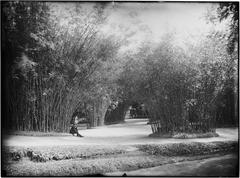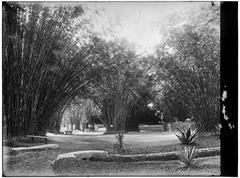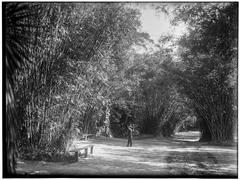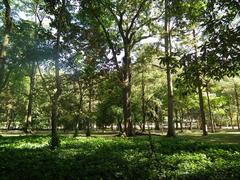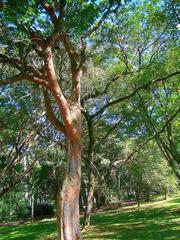
Guide to Visiting Jardim Botânico, Niterói, Brazil
Publication Date: 23/07/2024
Introduction
Nestled in the vibrant city of Niterói, Brazil, the Jardim Botânico de Niterói offers a unique blend of ecological, cultural, and educational experiences. Established in 1992, this botanical garden is a sanctuary for both native and exotic plant species. Spanning approximately 26 hectares, it is home to over 15,000 plant species, many of which are rare or endangered. The garden serves as an important center for botanical research and conservation efforts, making it a must-visit destination for nature enthusiasts and families alike (Niterói website).
The Jardim Botânico de Niterói also plays a crucial role in promoting environmental education and conservation. It offers a variety of programs, including guided tours, workshops, and lectures, aimed at educating the public about the importance of biodiversity. These initiatives make the garden a cultural and educational hub, attracting visitors from all walks of life. Additionally, its architectural and artistic features, such as the Japanese Garden and Medicinal Plant Garden, provide aesthetic and educational value (Jardim Botânico events).
For those planning a visit, the garden offers affordable ticket prices and is open daily from 8:00 AM to 5:00 PM. The garden’s well-maintained pathways, accessibility features, and amenities like a visitor center, gift shop, and café ensure a comfortable and enjoyable experience for all visitors. Nearby attractions, such as the Museum of Contemporary Art and Niterói City Park, further enhance the appeal of this green oasis (MAC Niterói, Parque da Cidade).
Contents
- Introduction
- History and Significance
- Early Development and Establishment
- Ecological Importance
- Cultural and Educational Role
- Visitor Information
- Tickets and Visiting Hours
- Architectural and Artistic Features
- Community Engagement and Events
- Future Prospects and Challenges
- Notable Plant Collections
- Research and Conservation Initiatives
- Visitor Experience
- Accessibility and Inclusivity
- Nearby Attractions
- Environmental Sustainability
- FAQ
- Conclusion
History and Significance
Early Development and Establishment
The Jardim Botânico de Niterói, also known as the Niterói Botanical Garden, is a relatively recent addition to the city’s array of cultural and natural attractions. Established in 1992, the garden was created to serve as a green space for the public and to promote environmental education and conservation. The site was chosen for its rich biodiversity and its potential to become a sanctuary for both native and exotic plant species.
Ecological Importance
Spanning approximately 26 hectares, the garden is home to over 15,000 plant species, including many that are rare or endangered. The diversity of flora found in the garden is a testament to Brazil’s rich natural heritage. The garden plays a crucial role in the conservation of these species, providing a controlled environment where they can thrive and be studied. This makes the Jardim Botânico de Niterói an important center for botanical research and conservation efforts.
Cultural and Educational Role
In addition to its ecological significance, the Jardim Botânico de Niterói serves as a cultural and educational hub. The garden offers a variety of programs aimed at educating the public about the importance of biodiversity and environmental conservation. These programs include guided tours, workshops, and lectures that cover a wide range of topics, from plant biology to sustainable gardening practices. The garden also collaborates with local schools and universities to provide hands-on learning experiences for students.
Visitor Information
Tickets and Visiting Hours
- Ticket Prices: Admission to the Jardim Botânico de Niterói is affordable, with tickets priced at approximately R$10 for adults and R$5 for students and seniors. Children under the age of 5 can enter for free.
- Visiting Hours: The garden is open daily from 8:00 AM to 5:00 PM, including weekends and holidays. It is advisable to check their official website for any updates or changes to the schedule.
Architectural and Artistic Features
The garden is not only a haven for plant life but also a showcase of architectural and artistic elements. The design of the garden incorporates various thematic sections, each with its own unique layout and plant collections. Notable features include the Japanese Garden, which offers a tranquil setting with traditional Japanese landscaping elements, and the Medicinal Plant Garden, which highlights the use of plants in traditional medicine.
Community Engagement and Events
The Jardim Botânico de Niterói is a popular venue for community events and activities. Throughout the year, the garden hosts a variety of events, including plant fairs, art exhibitions, and cultural festivals. These events provide opportunities for the community to engage with the garden and learn more about its mission. The garden also offers volunteer programs, allowing individuals to contribute to its maintenance and development.
Future Prospects and Challenges
Looking ahead, the Jardim Botânico de Niterói faces several challenges and opportunities. One of the primary challenges is securing adequate funding to support its operations and expansion. The garden relies on a combination of public funding, private donations, and revenue from events and programs. Ensuring a steady stream of financial support is crucial for the garden’s continued success.
On the other hand, the garden has the opportunity to expand its reach and impact through partnerships with other botanical gardens, research institutions, and environmental organizations. By collaborating with these entities, the Jardim Botânico de Niterói can enhance its conservation efforts and contribute to global initiatives aimed at preserving biodiversity.
Notable Plant Collections
The garden’s extensive plant collections are one of its most significant features. Among the notable collections are the Orchid Collection, which includes a wide variety of native and exotic orchids, and the Bromeliad Collection, which showcases the diversity of this unique plant family. The garden also features a collection of rare and endangered species, highlighting the importance of conservation efforts.
Research and Conservation Initiatives
The Jardim Botânico de Niterói is actively involved in research and conservation initiatives. The garden collaborates with local and international researchers to study plant species and their ecosystems. These research efforts contribute to a better understanding of plant biology and ecology, which in turn informs conservation strategies. The garden also participates in seed banking and plant propagation programs, ensuring the preservation of genetic diversity.
Visitor Experience
Accessibility and Inclusivity
The garden is committed to being accessible and inclusive for all visitors. Efforts have been made to ensure that the garden is wheelchair accessible, with paved pathways and ramps throughout the site. The garden also offers programs and materials in multiple languages, catering to the diverse population of Niterói and its international visitors.
Nearby Attractions
Visitors to the Jardim Botânico de Niterói can also explore nearby attractions such as the Museum of Contemporary Art (MAC), the Niterói City Park, and the beautiful beaches of Icaraí and Itacoatiara (MAC Niterói, Parque da Cidade).
Environmental Sustainability
Sustainability is a core principle of the Jardim Botânico de Niterói. The garden employs various sustainable practices, such as composting, rainwater harvesting, and the use of organic fertilizers. These practices not only reduce the garden’s environmental footprint but also serve as educational examples for visitors and the community.
FAQ
What are the visiting hours of Jardim Botânico de Niterói?
The garden is open daily from 8:00 AM to 5:00 PM, including weekends and holidays.
How much is the ticket for Jardim Botânico de Niterói?
Tickets are priced at approximately R$10 for adults and R$5 for students and seniors. Children under the age of 5 can enter for free.
Is the garden wheelchair accessible?
Yes, the garden is wheelchair accessible with paved pathways and ramps throughout the site.
Conclusion
The Jardim Botânico de Niterói is a vital institution that contributes to the conservation of plant biodiversity, provides educational opportunities, and serves as a cultural and recreational space for the community. Its rich history and ongoing efforts to promote environmental sustainability make it a significant landmark in Niterói and an essential destination for visitors. For more information, you can visit the official website. Stay updated by following us on social media and checking out our mobile app for the latest news and events.
References
- Visiting the Jardim Botânico de Niterói - History, Tickets, and More, 2024, Author https://www.niteroi.rj.gov.br/jardimbotanico
- Visiting Jardim Botânico in Niterói - Hours, Tickets, Tips & More, 2024, Author https://www.jardimbotanico.gov.br
- Explore Jardim Botânico in Niterói - Visiting Hours, Tickets, and Top Attractions, 2024, Author https://www.macniteroi.com.br
- Explore Jardim Botânico in Niterói - Visiting Hours, Tickets, and Top Attractions, 2024, Author https://www.parquedacidade.com.br
